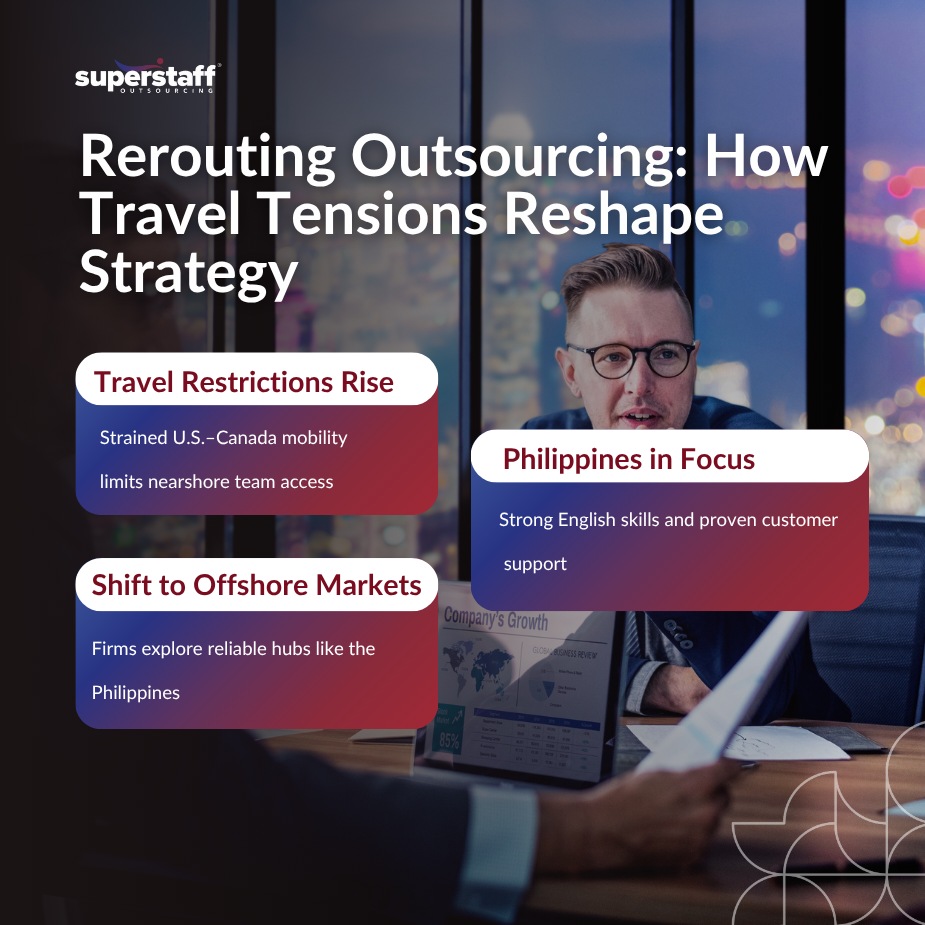
Tighter travel restrictions between the U.S. and Canada are shifting the dynamics of global business. What used to be a seamless route for professionals, digital nomads, and cross-border collaboration is now more complex. As these limitations continue, companies are looking elsewhere for uninterrupted operations. This change is influencing global outsourcing strategies across industries.
As physical mobility becomes less reliable, businesses are turning to global outsourcing as a solution. Countries with strong infrastructure, proven talent pools, and business-friendly policies are stepping up to meet the demand. One standout destination is the Philippines, especially for customer service outsourcing. The shift from tourism-based exchanges to talent-based global partnerships shows how resilient and adaptive global outsourcing strategies can be.

Changing Travel, Changing Strategies
As access between North American neighbors becomes more complicated, companies are thinking more broadly. Here’s how global outsourcing strategies are evolving in response to the travel tensions.
1. Rerouting Talent Acquisition
With border restrictions limiting mobility, many companies are turning to remote global hiring. Outsourcing opens doors to skilled talent without requiring relocation. This rerouting saves costs and keeps projects on schedule despite travel issues.
2. Reducing Dependency on Cross-Border Teams
Previously, many companies relied on split teams operating in the U.S. and Canada. With travel bans, this model becomes less dependable. Outsourcing to regions like Southeast Asia helps reduce risks tied to physical location.
3. Filling Service Gaps Remotely
Travel tensions have made it harder to move executives and service experts quickly across borders. Outsourced teams provide the consistency businesses need to maintain service levels. This shift is helping global outsourcing strategies support business continuity.
4. Focusing on Digital Over Physical Presence
Restrictions on travel encourage companies to prioritize virtual solutions. Outsourcing firms offer well-equipped remote teams, making physical proximity less important. This is especially valuable in functions like IT support and customer service.
5. Adjusting for Delays in Immigration Processing
Longer visa processing times mean that hiring foreign professionals is no longer a quick solution. Global outsourcing strategies eliminate this barrier. Businesses can work with international teams without navigating immigration delays.
Realigning Global Priorities
Travel bans are pushing companies to reevaluate not just where, but how they do business. These adjustments are setting the stage for more agile and diversified global outsourcing strategies.
1. Choosing Stable Talent Hubs
Countries with low geopolitical risk and good communication infrastructure are rising in preference. The Philippines is a prime example, especially for customer service outsourcing. Its workforce is known for strong English skills and cultural compatibility.
2. Outsourcing as a Long-Term Strategy
Temporary travel restrictions have led companies to create more permanent offshore solutions. What began as a short-term response is now becoming a key part of business planning.
3. Improving Crisis Preparedness
Travel disruptions revealed the need for more robust contingency plans. Global outsourcing strategies now include multi-location outsourcing models, which give companies better flexibility.
4. Emphasizing Time Zone Coverage
Instead of limiting talent search to North America, companies are looking globally to achieve round-the-clock support. Teams in the Philippines or India allow businesses to operate 24/7.
5. Revisiting Cost Allocation
With less money going toward travel and relocation, companies are reinvesting those resources into outsourced partnerships. This move enhances productivity without added overhead.
Travel Limitations Create New Opportunities
The impact of travel bans on outsourcing isn’t all negative. In fact, it’s creating room for better, smarter decisions in sourcing talent.
1. Focusing on Skills, Not Borders
The question “How are U.S.–Canada travel bans affecting outsourcing operations?” reveals a key truth: companies are no longer tied to geography. Skillsets matter more than location, and outsourcing enables access to global expertise.
2. Strengthening Offshore Training Programs
With physical visits off the table, outsourcing providers are investing more in virtual training tools. This helps ensure smooth onboarding and stronger results.
3. Enhancing Communication Channels
Outsourced teams are adopting better communication protocols to bridge the distance. From project tracking platforms to 24/7 support, outsourcing providers are stepping up their game.
4. Relying on Partners with Local Knowledge
Since sending internal teams to new countries is less feasible, companies lean on BPO partners with on-the-ground expertise. These partnerships reduce risk and improve outcomes.
5. Redefining Metrics for Productivity
Without the ability to assess performance in person, companies are adopting clearer output-based measures. This approach aligns well with the strengths of global outsourcing strategies.
Spotlight on the Philippines
The Philippines continues to grow its reputation as a top outsourcing destination, especially for North American businesses seeking consistency despite travel limits.
1. Leading in Customer Service Outsourcing
The Philippines stands out in the BPO sector, particularly for customer service. U.S. companies benefit from the country’s cultural alignment and skilled workforce. Customer service outsourcing Philippines remains a strong draw.
2. English Proficiency and Accent Neutrality
The Filipino workforce is known for high English fluency and neutral accents. These qualities make communication smoother and customer experiences more seamless.
3. Business-Friendly Policies
The Philippine government supports the BPO industry with tax incentives and infrastructure development. These factors improve outsourcing outcomes.
4. Strong Educational System
A high literacy rate and a large number of college graduates provide a steady pipeline of qualified professionals across various fields.
5. Digital Infrastructure Growth
With increased investment in internet connectivity and business hubs, the Philippines is better equipped to serve global outsourcing demands.
Moving Beyond Borders for Good
The shift from traditional, location-based collaboration to global outsourcing is not temporary. It’s becoming a strategic advantage for companies seeking flexibility, cost savings, and access to talent.
1. Changing Views on Mobility
What used to be a preference for on-site or near-site teams is evolving. Businesses now see remote partnerships as a long-term solution.
2. Supporting Sustainability Goals
Less business travel means lower emissions and improved environmental impact. Outsourcing aligns with these goals while maintaining performance.
3. Reducing Risk of Local Disruptions
Political issues, health crises, or weather-related disruptions in one country are less damaging when operations are spread globally.
4. Expanding Global Talent Pools
Outsourcing strategies now include scouting talent from multiple continents, not just regions within North America. This increases access to skills.
5. Embracing Digital-first Operations
As businesses get comfortable with digital workflows, outsourcing teams integrate more easily into day-to-day operations.
Flexible, Scalable, Border-Free Outsourcing
Businesses are finding long-term value in global outsourcing strategies as they adapt to shifts in travel, talent access, and economic planning. Rather than rely on one region or model, companies are building flexible systems that withstand change.
The impact of travel bans on outsourcing revealed how vulnerable businesses can be when they rely on physical access to talent. SuperStaff offers reliable, scalable outsourcing support for companies looking to expand their reach, especially in customer service, tech support, back office, and more.
Partner with SuperStaff to strengthen your global outsourcing strategies while staying focused on growth and consistency, wherever your business operates.






